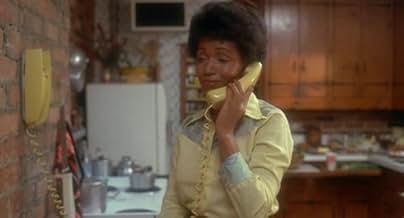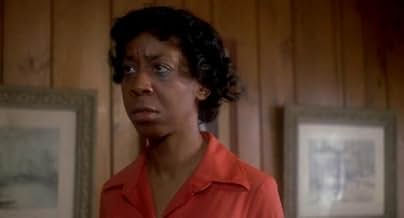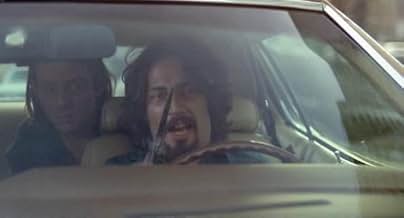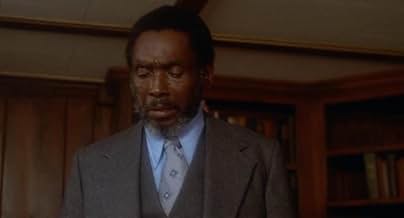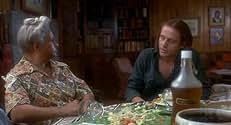AVALIAÇÃO DA IMDb
6,3/10
1,8 mil
SUA AVALIAÇÃO
Adicionar um enredo no seu idiomaThree escaped convicts hold a black minister and his family hostage, forcing them to fight for their lives.Three escaped convicts hold a black minister and his family hostage, forcing them to fight for their lives.Three escaped convicts hold a black minister and his family hostage, forcing them to fight for their lives.
Reggie Rock Bythewood
- Floyd Turner
- (as Reginald Bythewood)
Nick Hardin
- Tony
- (as Nick Mariano)
Avaliações em destaque
FIGHT FOR YOUR LIFE (1977) **** William Sanderson, Robert Judd, Dan Faraldo, Peter Yoshida. If there was ever a movie that could push the audience's buttons, it was Fight for Your Life. During its limited theatrical run, it reportedly caused near riots in theaters wherever it was shown. It's easy to see why. The movie follows three escaped convicts, led by racist hillbilly psychopath Jesse Cain (William Sanderson), who take an African-American family hostage in their home and torture them. Cain spews vicious racial epithets almost constantly as he and his cohorts (who, ironically enough, are Latino and Asian) subject the family to a host of racial and sexual humiliations. Though it's easy to dismiss as mere exploitation, Fight for Your Life speaks volumes about what America had on its collective mind in the late 1970's, reflecting anxieties about the effects of drugs, violent crime and volatile race relations on the country. Of course, it's also great entertainment. Thanks to a strong script from Straw Weisman and Robert Endelson's smart direction, there's never a dull moment in this film, though it certainly isn't for all viewers.
The promotional gallery of posters, lobby cards, and stills on Blue Underground's DVD release of "Fight for Your Life" give one the impression that it's merely the umpteenth addition to the pile of exploitative revengers inspired by Wes Craven's landmark "Last House on the Left"; even the trailers (a 'white' and 'black' version) depict the money shots in what promises to be another parade of cruelty for cruelty's sake, accompanied by '70s soul music.
Yet when I got around to watching the movie itself, I was more than a little impressed by the frequency with which it ran contrary to my low expectations, to the point where I really did feel like applauding and cheering on the heroes. "Fight for Your Life" is more politically ambitious than the LHotL imitators it is commonly lumped in with, transposing the race roles of slave times (the 'master' is a moneyed man who cracks a mean whip; the 'slaves' are quietly obedient out of fear of abuse) into the late-1970s, after the Civil Rights movement, where blacks are only starting to find their place in an overwhelmingly white society. Robert Judd plays a pacifist minister whose family is taken hostage by a trio of thugs (led by the fantastically scummy Willaim Sanderson, whose dialog is a catalog of racial epithets) who get a perverse entertainment out of the torture, rape, and humiliation of their hostages. Of course the tables are turned in the third reel, but the film goes about it in a cleverly justified way. By making the criminals so unredeemable (and thankfully avoiding the clichéd comic relief some films gravitate toward), we are on the edge of our seats, waiting for their comeuppance; but "Fight for Your Life" also engenders multi-layered characters grappling with their own moral conflicts that makes the resulting graphic violence resonate on a deeper level.
The film contains some genuinely moving, even heartbreaking moments that would not carry such an impact if we didn't relate so strongly to the victims: the quiet aftermath of a rape (the details of which are not explicitly rendered); humiliation that unexpectedly turns to uplift (when Judd's character is forced to sing on a pedestal at gunpoint); the by-the-book police lieutenant who eavesdrops on the family's revenge, only to allow it to continue out of sympathy.
Though my review thus far might turn off those seeking a hard-edged revenge thriller, let it be known that "Fight for Your Life" is not a sentimental piece--quite the contrary, it is just as lurid and seedy as the best (worst) of the genre; the violence is vivid and unsettling, made all the more so by the reality of the characters and their situation. Though low-budget productions tend to be hampered by exaggerated acting and unconvincing effects by default, the whole cast is convincing in selling the premise, and reminding us that even genre pics can reach for high concepts and succeed.
Yet when I got around to watching the movie itself, I was more than a little impressed by the frequency with which it ran contrary to my low expectations, to the point where I really did feel like applauding and cheering on the heroes. "Fight for Your Life" is more politically ambitious than the LHotL imitators it is commonly lumped in with, transposing the race roles of slave times (the 'master' is a moneyed man who cracks a mean whip; the 'slaves' are quietly obedient out of fear of abuse) into the late-1970s, after the Civil Rights movement, where blacks are only starting to find their place in an overwhelmingly white society. Robert Judd plays a pacifist minister whose family is taken hostage by a trio of thugs (led by the fantastically scummy Willaim Sanderson, whose dialog is a catalog of racial epithets) who get a perverse entertainment out of the torture, rape, and humiliation of their hostages. Of course the tables are turned in the third reel, but the film goes about it in a cleverly justified way. By making the criminals so unredeemable (and thankfully avoiding the clichéd comic relief some films gravitate toward), we are on the edge of our seats, waiting for their comeuppance; but "Fight for Your Life" also engenders multi-layered characters grappling with their own moral conflicts that makes the resulting graphic violence resonate on a deeper level.
The film contains some genuinely moving, even heartbreaking moments that would not carry such an impact if we didn't relate so strongly to the victims: the quiet aftermath of a rape (the details of which are not explicitly rendered); humiliation that unexpectedly turns to uplift (when Judd's character is forced to sing on a pedestal at gunpoint); the by-the-book police lieutenant who eavesdrops on the family's revenge, only to allow it to continue out of sympathy.
Though my review thus far might turn off those seeking a hard-edged revenge thriller, let it be known that "Fight for Your Life" is not a sentimental piece--quite the contrary, it is just as lurid and seedy as the best (worst) of the genre; the violence is vivid and unsettling, made all the more so by the reality of the characters and their situation. Though low-budget productions tend to be hampered by exaggerated acting and unconvincing effects by default, the whole cast is convincing in selling the premise, and reminding us that even genre pics can reach for high concepts and succeed.
This is a pretty nasty piece of work that is nevertheless well made and effective. Race, rape and revenge but much more too when a modest God fearing black family are set upon by three escaped convicts who don't seem to like each other much more than do their captives. Much racist abuse and humiliation, though this all gets reversed as the family regain the upper hand and the 'by the book' cop makes an exception and allows the revenge to run it's course. Vile, exciting, hateful and touching by turns this is a very unusual, though non the more likable piece of exploitation cinema. Absolutely no way this film would be even considered today let alone be made and yet, in its own way it draws attention to that unspeakable prejudice within us all.
Fight For Your Life (FFYL) is a hugely misunderstood film. Pretty much every low budget film with any kind of violent content was labelled a "video nasty" in the 80s but FFYL's notoriety even stands out from the rest of the "video nasty" crowd.
FFYL's bad reputation mostly stems from the film's rape/revenge scenario, which has resulted in comparisons with films like "I Spit On Your Grave" and "The Last House On The Left". While I greatly admire both of those films, they really have little in common with FFYL as far as tone and context are concerned. They all share a rape/revenge plot twist but the sexual assault in FFYL plays a relatively minor role in the film and is less graphically presented than rape scenes in mainstream fare such as "The Accused", let alone "Irreversible".
The other main aspect of FFYL's notoriety is the accusation of racism. The use of racist terminology is confronting and the scene in which Kane makes Ted dance and sing is, in my opinion, more shocking than any of the violence. However, the film is never less than sympathetic with the plight of the Turner family and the way in which their revenge is presented excludes the presence of any kind of racist agenda as far as I'm concerned.
Overlooking the controversy, what remains is a tightly constructed and expertly paced thriller. The film is quite brilliantly scripted. The characters ring true and the dialogue is sharp and often funny. The actors, with the exception of the ham who plays Lt. Reilly, all give great performances. William Sanderson, in particular, is magnificently vile as Kane.
Don't let this film's unjust reputation put you off. FFYL is a very good movie that deserves a wider audience.
FFYL's bad reputation mostly stems from the film's rape/revenge scenario, which has resulted in comparisons with films like "I Spit On Your Grave" and "The Last House On The Left". While I greatly admire both of those films, they really have little in common with FFYL as far as tone and context are concerned. They all share a rape/revenge plot twist but the sexual assault in FFYL plays a relatively minor role in the film and is less graphically presented than rape scenes in mainstream fare such as "The Accused", let alone "Irreversible".
The other main aspect of FFYL's notoriety is the accusation of racism. The use of racist terminology is confronting and the scene in which Kane makes Ted dance and sing is, in my opinion, more shocking than any of the violence. However, the film is never less than sympathetic with the plight of the Turner family and the way in which their revenge is presented excludes the presence of any kind of racist agenda as far as I'm concerned.
Overlooking the controversy, what remains is a tightly constructed and expertly paced thriller. The film is quite brilliantly scripted. The characters ring true and the dialogue is sharp and often funny. The actors, with the exception of the ham who plays Lt. Reilly, all give great performances. William Sanderson, in particular, is magnificently vile as Kane.
Don't let this film's unjust reputation put you off. FFYL is a very good movie that deserves a wider audience.
It's easy to see why "Fight For Your Life" would provoke certain viewers into a fury. The chief bad guy of the movie is an extreme racist, and over and over he subjects the black family that he holds hostage to various kinds of humiliation and degradation.
However, while the movie does have some shocking moments, I wasn't as offended as I thought I would be. There is a touch of an absurd (and comic) tone in the background of the movie throughout. This has the movie frequently going over the top, and thus it's often hard to take things completely seriously. Also, the performance of William Sanderson is one that's of the right note. Although you'll hate his character's guts, he is so energetic and playful that at the same time you'll find him entertaining.
But this movie is DEFINITELY not for everyone. If you haven't been offended by other notorious extreme exploitation movies like "Last House On The Left" and "I Spit On Your Grave", then it's probably safe to give this movie a look. If you are very politically correct and/or easily offended, stay away.
However, while the movie does have some shocking moments, I wasn't as offended as I thought I would be. There is a touch of an absurd (and comic) tone in the background of the movie throughout. This has the movie frequently going over the top, and thus it's often hard to take things completely seriously. Also, the performance of William Sanderson is one that's of the right note. Although you'll hate his character's guts, he is so energetic and playful that at the same time you'll find him entertaining.
But this movie is DEFINITELY not for everyone. If you haven't been offended by other notorious extreme exploitation movies like "Last House On The Left" and "I Spit On Your Grave", then it's probably safe to give this movie a look. If you are very politically correct and/or easily offended, stay away.
Você sabia?
- CuriosidadesThe marketing of this film was unique and unusual. For example, there was a theatrical trailer for the film that was geared toward Caucasian audiences, and another theatrical trailer for the film that was geared towards African-American audiences (using the alternate title of the movie, "Stayin' Alive"). Another example would be the teaser trailer, which was just an almost 30-second clip, without music and sound, of a still-photograph from the movie, along with the title and MPAA rating.
- Erros de gravaçãoThe first time we see the Turner family's pet dog on the couch, a wire is seen and a hand to the left of the screen is clearly moving up and down. The wire is attached to the dogs tail and is being used to wag its tail, suggesting the dog is being friendly.
- Citações
Jessie Lee Kane: [to Ted Turner] Repeat after me..."Yes sir massah Kane sir, all of us black-ass coons is hungry!"
- Versões alternativasVery graphic scene of boy getting head beaten to pulp with a rock has been cut from some prints.
- ConexõesFeatured in American Grindhouse (2010)
Principais escolhas
Faça login para avaliar e ver a lista de recomendações personalizadas
- How long is Fight for Your Life?Fornecido pela Alexa
Detalhes
Contribua para esta página
Sugerir uma alteração ou adicionar conteúdo ausente

Principal brecha
By what name was Fight for Your Life (1977) officially released in India in English?
Responda
